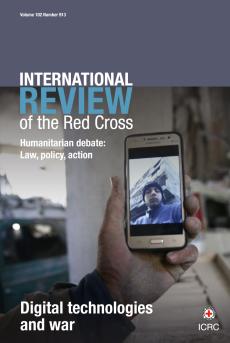IRRC No. 913 Digital technologies and war
25 articles
Digital innovation today is more rapid than ever before, with potential implications for much of the societal landscape. The operating paradigm for humanitarian actors is no exception to this, nor is the unique environment of armed conflict contexts. For humanitarian actors and the communities they serve, new technologies are both a beacon of hope and a series of challenges requiring careful responses. Digital payments and machine learning may allow for more effective humanitarian action, but implementation without full consideration of associated risks may create inequity in humanitarian access. Digital device penetration and the data that devices produce may ease access to those in need, but also present new challenges to human dignity - ranging from risks to individual privacy and security, to new permutations of gender-based discrimination and violence. The internet allows for unprecedented public engagement, but also brings into sharp focus the importance of ensuring that law works to protect civilians. These Janus-faced phenomena, among many others, demonstrate the potential transformative effects of digital innovation. In light of the importance of digital technology and its development to the humanitarian sector, humanitarian action and the protection of vulnerable communities, this edition of the Review is dedicated to examining the interactions between digital technologies and war.

